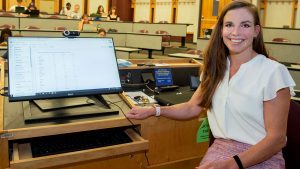SIU researcher tackles climate change education for young learners
By Tim Crosby SIU News — October 9, 2022
Kristin Hurst, assistant professor of sustainability in the School of Earth Systems and Sustainability at Southern Illinois University Carbondale (Photo courtesy of SIU)
Teaching climate change science needs to be done sooner and more often, says a Southern Illinois University Carbondale researcher.
Kristin Hurst, an assistant professor of sustainability in the School of Earth Systems and Sustainability, and a team of researchers recently received a $150,000 grant from Oak Ridge Associated Universities (ORAU) to discover how to best combine effective climate change communication with best practices for teaching science to young learners. The goal is to identify when and how climate science can most effectively be introduced to middle school and high school curriculums.
Hurst said the effort is aimed at imparting literacy and knowledge about the science, as well as encouraging students to take action.
“We hope it will instill in learners a conviction that addressing climate change is an important and urgent societal goal that they have agency to help achieve,” she said. “This is important because effective climate change science education can help to foster the type of engaged citizenship we need to advance solutions and mitigate the worst impacts of climate change.”
For our own good
Climate change education can play a key role in fostering widespread public engagement with the issue, Hurst said. But many efforts to teach climate science, let alone foster engagement, can be inhibited by motivated reasoning, or a tendency to process information in a way that aligns with pre-existing values, beliefs and/or identities.
Although most research in this area has focused on adults, there is emerging evidence of a similar pattern among high school students, but not middle school students.
“This suggests that middle school could be an ideal time to comprehensively incorporate climate change education into science curriculum in order to foster science-supported thinking over the long term,” Hurst said.
The research project aims to conduct a systematic comparison of motivated reasoning in the context of climate change education between middle and high school.
Reaching students online
Hurst’s expertise is in environmental psychology. She is collaborating with Ross Toedte,
president and chief research officer at the Science Education Research Foundation, who focuses on climate change education for elementary- and middle-school-age learners. Chris Nelson, Education project manager; and Jennifer Tyrell, associate manager of the K-12 group at ORAU, also are working on the project.
The team hopes to reach 2,000 middle school and high school students across the country to participate in a 30-minute online activity that evaluates how the cultural values of young learners influence their interpretation and understanding of a climate change lesson. They also want to examine how such lessons are designed and presented to help teachers and curriculum developers identify more effective strategies and timing to introduce climate science at those grade levels.
“Our partners at ORAU are well equipped to reach these students through their existing network of K-12 educators,” Hurst said. “We are designing both the climate science lessons and an online survey for our participants.”
Reaching them where they are
Climate change science bundles a lot of disciplines including chemistry, physics and geology, among others. Although, from a science standpoint, climate change science is no different than those disciplines, prior research has found that people’s beliefs about climate change, and opinions on how they think it should be addressed, are influenced more by cultural values and identities than facts or knowledge.
“Understanding individual learners, including their backgrounds and cultural identities, is a hallmark of effective teaching, regardless of the topic,” Hurst said. “Our project seeks to explore whether this is also the case for young learners, what can be done to promote scientifically grounded knowledge and how to foster a sense of agency.”







